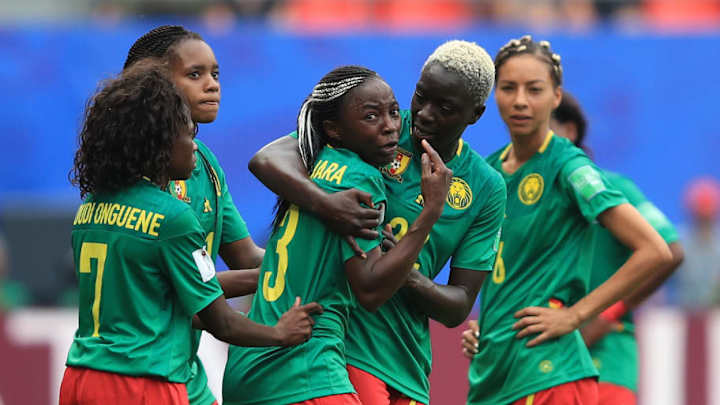England Win Over Cameroon Marred by Both Indomitable Lionesses' Antics AND the Reaction to Them

Some football matches are an absolute nightmare to write about, because nothing happens. Then sometimes you get a game like England's 3-0 win over Cameroon in Valenciennes, a nightmare to write about because...how do you unpack all of that on the final whistle?
How do you catalogue a series of events like that? Do you go chronologically, or by order of imagined importance? Is the importance only that which affects the result of a single match, or what people are going to talk about for some time to come?
It's important to have a system. And HEY, speaking of systems, did you know there's a video review system at the Women's World Cup?
Cameroon sure as hell do. On the stroke of half time, with the score at 1-0 to England, the assistant referee raised her flag after Ellen White put the ball in the back of the net. The video assistant referee went back, had a look at the tape, and (with absolute, concrete correctness) ruled that White had been onside and the goal should stand.
3 - England’s 3-0 win over Cameroon was their second-biggest margin of victory in a Women’s World Cup game, only behind their 6-1 win over Argentina in the 2007 group stage. Rolling. #FIFAWWC #ENGCAM pic.twitter.com/dk2ZqFgdOz
— OptaJoe (@OptaJoe) June 23, 2019
England celebrated, players started to amble back to the halfway line, then a replay of the goal popped up on the big screen and all hell broke loose.
The couple of seconds that the image was on the screen was enough for some of the Cameroon players to decide (it must be said, incorrectly) that they had been unfairly treated and the goal shouldn't have stood.
The whole team gathered in the centre circle for a good minute or more, refusing to restart the game – eventually going back to their places once the referee re-awarded the goal. A brief huddle on the pitch when the half-time whistle blew, and then off into the tunnel.
Cameroon's Raissa Feudjio stopped to blame the refereeing after the match, saying: "The lineswoman said it was offside but the referee refused the goal without even checking. We continued playing for our country despite the referee doing her dirty work.
"(White) was offside. But the referee did not even go to check the goal. She gave the goal. But then our goal was disallowed and we found ourselves in a difficult situation where most of us do not want to play. We didn't want to play any more. We just wanted the game to be over. But because we were playing for our country we decided to go on."
They emerged from the dressing room very early with a team official, and huddled once again in the centre circle until England came out. Everyone played on, things started to cool down, and Cameroon had the ball in the net two and a half minutes later thanks to a brilliant finish from Ajara Nchout. That goal, however, was ruled out.
The scenes which followed the decision were close to unprecedented. The Cameroon players all went over to their bench, the non-scorer Nchout was in tears and at one point was pulled bodily back into the pitch by her teammates. Boos rang around the stadium, although it was entirely unclear who they were from, or aimed at.
Alexandra Takounda came on, and had a glorious chance one on one with Karen Bardsley almost immediately. Saved. When England – at this point 3-0 up – had a penalty review for a possible foul on Fran Kirby, the entire stadium held its breath. A walk-off felt on the cards. The penalty wasn't given. The game continued.
Just before the final whistle blew, Takounda hit England skipper Steph Houghton with a horrible tackle, raking down her heel and leaving the Man City star on the treatment table instead of at the post-match press conference. The referee, perhaps mindful of getting the game finished without further incident, gave just a yellow card after reviewing the decision (again).
It's hard to know what to make of Cameroon's actions. On the one hand, they made a mockery of the match and the competition it was being played in, refusing to accept the referee's decisions on face value. The foul on Houghton was late, dangerous and utterly needless.
Manager Alan Djeumfa's comments after the game were very clear, insisting that bad decisions went against his side. He was, again, wrong. Both goals were correctly ruled, and if anything Takounda got away with a red card offence late on. "It was a miscarriage of justice," he said. "Why should I talk about anything other than that?"
However. On the other hand. In mitigation. All of these 'both sides' phrases. From Cameroon's point of view, they were being cheated. There's no doubt that, whether from a misunderstanding of the VAR process, a misreading of a big screen replay or something else entirely, they genuinely believed that they were being robbed.
Had they been correct, they would've been...well, right. They, as players who have had to fight tooth and nail to make a living wage, to be supported by their federation, to get to France in the first place...were being cheated out of their place in the quarter finals.
They were wrong. But the emotional strength of the reaction was entirely understandable, given the circumstances that they'd perceived.
It's time – and at time of writing, most of the players and press are still in the stadium – to take a step back and have some perspective. Would the game have been better if Cameroon hadn't reacted the way they did? Obviously. Are they human, with human reactions to the most pressurised moment of her lives? That too. Let's just try to remember that before condemning them out of hand.
